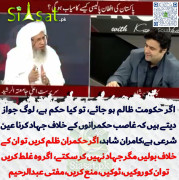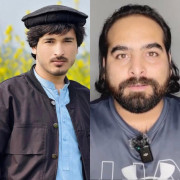M Ali Khan
Minister (2k+ posts)
India’s bubble
Any person possessing or eating beef in the great state of Maharashtra can now be imprisoned for a period of up to five years and fined Indian Rs 10,000. Consider the fact that Pakistan, which is officially an Islamic state, does not criminalise possessing or eating of pork

India is all about its marketing. This is something they figured out as a country early on: packaging matters, regardless of the substance. Much of the shining India myth is based more on art than substance. The fierce protective instinct that Indians have towards their country is almost endearing and would be worth emulating if it was not so stifling on occasion.
Last year, I experienced this first hand. Throughout my stay in Delhi, I posted updates through social media. It so happened I was in Lutyens’ Delhi for the first few days of my trip and my descriptions of Delhi’s Khan Market and Aurangzeb Road, of Taj Mansingh and of Claridges were deemed positively flattering by my Indian friends. Things changed drastically on the fifth day when I started reporting on the abject poverty I experienced in South Delhi and old Delhi; one uncle, whom I have known for a decade and a half and who is a renowned food journalist in India, even threatened to get me deported for “misusing my visa”.
It is about marketing boss and no one can be allowed. Shining India sans marketing is a third world country with huge disparities and social inequities. This is an unforgiveable criticism even from someone like me who has principally refused to look at India as the enemy.This is a strange kind of psychosis. Now, if India were a person, it would be an extremely insecure, egoistic and overly prickly individual, ready to draw daggers at anyone who dares criticise it.
Much of this was confirmed in the way India reacted to the film India’s Daughter. Many reasons are given for this opposition. One argument was that the airing of the film amounts to contempt of court. This is a flimsy excuse. Another one is that there was no “informed consent”.
Without getting into the merits of these arguments, suffice it to say that these arguments would have made sense if India had attempted only to block the airing of the video in its territorial jurisdiction. The Indian government’s notice to the BBC clearly indicates that its aim was to block the airing of the video globally. Not only were YouTube and Google too eager to please the Indian government, even the BBC was threatened and cowered into withdrawing the video from YouTube, citing “copyright infringement”.
Basically, the BBC has admitted that it cannot take on the government of India. For people like me — I was the counsel in the YouTube case before the Lahore High Court (LHC) –this complicates things further. On the one hand, the world’s largest democracy, which talks of democracy and secularism with a forked tongue, has effectively censored criticism of misogyny in its society and, on the other hand, the champions of free speech — Google and theBBC — have bent over backwards to accommodate India’s humongous ego. All the moral arguments one had about freedom of speech and open society have gone out the window.
The reason why India’s Daughter is a big deal is because it shows just how deep rooted misogyny is in Indian society and how perilous the state of women in India is. The comments by the defence counsel for the rapist especially smack of a medieval mindset that is commonplace, not just in India but all of South Asia. And make no mistake about it; we in Pakistan suffer from the same mindset. Yet that is the problem for India most of all. After all the hue and cry about secularism and democracy, there is nothing to distinguish it from its western neighbor, which it wants to paint as the sick man of South Asia.
If lawyers in Pakistan can garland and kiss a murderer, the defence counsel for the rapist claims that he would gladly burn his sister or daughter for any behaviour not keeping with the ideal of sati savitrinaari or the devotional, self-effacing and self-sacrificial lamb that a woman is expected to be.
Amazingly, the ban on India’s Daughter came the same week the state of Maharashtra, where the great cosmopolitan city of Mumbaiwith its huge Muslim population is located, decided to criminalise slaughter and possession of beef. Any person possessing or eating beef in the great state of Maharashtra can now be imprisoned for a period of up to five years and fined Indian Rs 10,000. Consider the fact that Pakistan, which is officially an Islamic state, does not criminalise possessing or eating of pork. This makes this ban even more unconscionable for a country that is so self-righteously pompous about its secular democratic credentials.
Of course, this has been a longstanding project of Indian nationalists pre-dating even partition. Gandhi had justified his support for the reactionary Khilafat Movement in the 1920s by saying that he wanted the cows to be spared the Muslim knife. The reasons had nothing to do with vegetarianism or love for animals (lamb slaughter or chicken slaughter has never had any political appeal) but the fact that the cow is a holy animal for the Hindus. Hindu cultural life thus was the bedrock upon which Indian nationalism was sediment. The project has reached fruition in 2015.
Make no mistake though; if one chooses to expose the hypocrisy of Indian claims to moral superiority it does not mean one should be blind to the tremendous failings of our own homeland. The point is that the problems we in South Asia face today — new and old, ancient and modern — religious bigotry, internet censorship, majoritarianism and the right wing social tilt are common to all of us.
All of South Asia needs to grapple with these problems together instead of harping on about false narratives and national pride. This is as true of Pakistan as it is of India. This — our common follies and shared misogyny and bigotry — hyphenates us whether or not Indians feel slighted by that. Let us not shy away from admitting that we stink as a region and we must rise as a region. To do that, however, we must bid farewell to “marketing” that makes us complacent and blind to our problems.
The writer is a lawyer based in Lahore and the author of the book Mr Jinnah: Myth and Reality. He can be contacted via twitter @therealylh and through his email address [email protected]
http://www.dailytimes.com.pk/opinion/09-Mar-2015/india-s-bubble/
Any person possessing or eating beef in the great state of Maharashtra can now be imprisoned for a period of up to five years and fined Indian Rs 10,000. Consider the fact that Pakistan, which is officially an Islamic state, does not criminalise possessing or eating of pork

- Yasser Latif Hamdani
- March 09, 2015
India is all about its marketing. This is something they figured out as a country early on: packaging matters, regardless of the substance. Much of the shining India myth is based more on art than substance. The fierce protective instinct that Indians have towards their country is almost endearing and would be worth emulating if it was not so stifling on occasion.
Last year, I experienced this first hand. Throughout my stay in Delhi, I posted updates through social media. It so happened I was in Lutyens’ Delhi for the first few days of my trip and my descriptions of Delhi’s Khan Market and Aurangzeb Road, of Taj Mansingh and of Claridges were deemed positively flattering by my Indian friends. Things changed drastically on the fifth day when I started reporting on the abject poverty I experienced in South Delhi and old Delhi; one uncle, whom I have known for a decade and a half and who is a renowned food journalist in India, even threatened to get me deported for “misusing my visa”.
It is about marketing boss and no one can be allowed. Shining India sans marketing is a third world country with huge disparities and social inequities. This is an unforgiveable criticism even from someone like me who has principally refused to look at India as the enemy.This is a strange kind of psychosis. Now, if India were a person, it would be an extremely insecure, egoistic and overly prickly individual, ready to draw daggers at anyone who dares criticise it.
Much of this was confirmed in the way India reacted to the film India’s Daughter. Many reasons are given for this opposition. One argument was that the airing of the film amounts to contempt of court. This is a flimsy excuse. Another one is that there was no “informed consent”.
Without getting into the merits of these arguments, suffice it to say that these arguments would have made sense if India had attempted only to block the airing of the video in its territorial jurisdiction. The Indian government’s notice to the BBC clearly indicates that its aim was to block the airing of the video globally. Not only were YouTube and Google too eager to please the Indian government, even the BBC was threatened and cowered into withdrawing the video from YouTube, citing “copyright infringement”.
Basically, the BBC has admitted that it cannot take on the government of India. For people like me — I was the counsel in the YouTube case before the Lahore High Court (LHC) –this complicates things further. On the one hand, the world’s largest democracy, which talks of democracy and secularism with a forked tongue, has effectively censored criticism of misogyny in its society and, on the other hand, the champions of free speech — Google and theBBC — have bent over backwards to accommodate India’s humongous ego. All the moral arguments one had about freedom of speech and open society have gone out the window.
The reason why India’s Daughter is a big deal is because it shows just how deep rooted misogyny is in Indian society and how perilous the state of women in India is. The comments by the defence counsel for the rapist especially smack of a medieval mindset that is commonplace, not just in India but all of South Asia. And make no mistake about it; we in Pakistan suffer from the same mindset. Yet that is the problem for India most of all. After all the hue and cry about secularism and democracy, there is nothing to distinguish it from its western neighbor, which it wants to paint as the sick man of South Asia.
If lawyers in Pakistan can garland and kiss a murderer, the defence counsel for the rapist claims that he would gladly burn his sister or daughter for any behaviour not keeping with the ideal of sati savitrinaari or the devotional, self-effacing and self-sacrificial lamb that a woman is expected to be.
Amazingly, the ban on India’s Daughter came the same week the state of Maharashtra, where the great cosmopolitan city of Mumbaiwith its huge Muslim population is located, decided to criminalise slaughter and possession of beef. Any person possessing or eating beef in the great state of Maharashtra can now be imprisoned for a period of up to five years and fined Indian Rs 10,000. Consider the fact that Pakistan, which is officially an Islamic state, does not criminalise possessing or eating of pork. This makes this ban even more unconscionable for a country that is so self-righteously pompous about its secular democratic credentials.
Of course, this has been a longstanding project of Indian nationalists pre-dating even partition. Gandhi had justified his support for the reactionary Khilafat Movement in the 1920s by saying that he wanted the cows to be spared the Muslim knife. The reasons had nothing to do with vegetarianism or love for animals (lamb slaughter or chicken slaughter has never had any political appeal) but the fact that the cow is a holy animal for the Hindus. Hindu cultural life thus was the bedrock upon which Indian nationalism was sediment. The project has reached fruition in 2015.
Make no mistake though; if one chooses to expose the hypocrisy of Indian claims to moral superiority it does not mean one should be blind to the tremendous failings of our own homeland. The point is that the problems we in South Asia face today — new and old, ancient and modern — religious bigotry, internet censorship, majoritarianism and the right wing social tilt are common to all of us.
All of South Asia needs to grapple with these problems together instead of harping on about false narratives and national pride. This is as true of Pakistan as it is of India. This — our common follies and shared misogyny and bigotry — hyphenates us whether or not Indians feel slighted by that. Let us not shy away from admitting that we stink as a region and we must rise as a region. To do that, however, we must bid farewell to “marketing” that makes us complacent and blind to our problems.
The writer is a lawyer based in Lahore and the author of the book Mr Jinnah: Myth and Reality. He can be contacted via twitter @therealylh and through his email address [email protected]
http://www.dailytimes.com.pk/opinion/09-Mar-2015/india-s-bubble/
Last edited by a moderator:
































